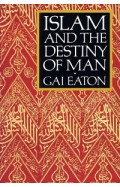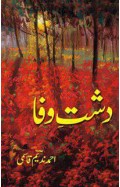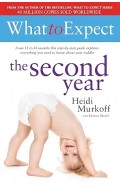Imaginal Worlds - Ibn Al-ʻArabī and the Problem of Religious Diversity
By: William C. Chittick
-
Rs 640.00
- Rs 800.00
- 20%
You save Rs 160.00.
Due to constant currency fluctuation, prices are subject to change with or without notice.
IMAGINAL WORLDS Ibn al-‘Arabi and the Problem of Religious Diversity
IMAGINAL WORLDS Ibn al-`Arabi and the Problem of Religious Diversity William C. Chittick Ibn ‘Arabi, known as the “Greatest Master,” is the most influential Muslim thinker of the past 600 years. This book is an introduction to his thought concerning the ultimate destiny of human beings, God and the cosmos, and the reasons for religious diversity. It summarizes many of Ibn `Arabi’s teachings in a simple manner. The ideas discussed are explained in detail. The book is divided into three parts. In the first part, Chittick explains Ibn `Arabi’s concept of human perfection; in the second part, he looks at various implications of the World of Imagination; and in the third part, he exposes Ibn al-`Arabi’s teachings on why God’s wisdom demands diversity of religious expression, and he suggests how these teachings can be employed to conceptualise the study of world religions in a contemporary context. *** “Imaginal Worlds is an excellent summary and a solid interpretation of Ibn al-`Arabi’s teachings.” —Gerhard Bowering, Yale University
IMAGINAL WORLDS Ibn al-‘Arabi and the Problem of Religious Diversity
IMAGINAL WORLDS Ibn al-`Arabi and the Problem of Religious Diversity William C. Chittick Ibn ‘Arabi, known as the “Greatest Master,” is the most influential Muslim thinker of the past 600 years. This book is an introduction to his thought concerning the ultimate destiny of human beings, God and the cosmos, and the reasons for religious diversity. It summarizes many of Ibn `Arabi’s teachings in a simple manner. The ideas discussed are explained in detail. The book is divided into three parts. In the first part, Chittick explains Ibn `Arabi’s concept of human perfection; in the second part, he looks at various implications of the World of Imagination; and in the third part, he exposes Ibn al-`Arabi’s teachings on why God’s wisdom demands diversity of religious expression, and he suggests how these teachings can be employed to conceptualise the study of world religions in a contemporary context. *** “Imaginal Worlds is an excellent summary and a solid interpretation of Ibn al-`Arabi’s teachings.” —Gerhard Bowering, Yale University
The Sufi Path of Love: The Spiritual Teachings of Rumi (Suny Series in Islamic Spirituality) (Suny Series, Islamic Spirituality)
By: William C. Chittick
Rs 1,062.50 Rs 1,250.00 Ex Tax :Rs 1,062.50
Science Of The Cosmos Science Of The Soul
By: William C. Chittick
Rs 560.00 Rs 700.00 Ex Tax :Rs 560.00
Imaginal Worlds - Ibn Al-ʻArabī and the Problem of Religious Diversity
By: William C. Chittick
Rs 640.00 Rs 800.00 Ex Tax :Rs 640.00
Zubin Mehta: A Musical Journey (An Authorized Biography)
By: VOID - Bakhtiar K. Dadabhoy
Rs 892.50 Rs 1,050.00 Ex Tax :Rs 892.50
Science Of The Cosmos Science Of The Soul
By: William C. Chittick
Rs 560.00 Rs 700.00 Ex Tax :Rs 560.00
Viva Dictionary Of Punctuation And Hyphenation
By: William Gould
Rs 127.50 Rs 150.00 Ex Tax :Rs 127.50
And Another Thing... (The Hitchhiker's Guide to the Galaxy)
By: Eoin Colfer
Rs 355.50 Rs 395.00 Ex Tax :Rs 355.50
Collins Pocket Italian Dictionary
By: Collins Dictionaries
Rs 1,847.50 Rs 3,695.00 Ex Tax :Rs 1,847.50
Science Of The Cosmos Science Of The Soul
By: William C. Chittick
Rs 560.00 Rs 700.00 Ex Tax :Rs 560.00
No recently viewed books available at the moment.
Zubin Mehta: A Musical Journey (An Authorized Biography)
By: VOID - Bakhtiar K. Dadabhoy
Rs 892.50 Rs 1,050.00 Ex Tax :Rs 892.50
The Sufi Path of Love: The Spiritual Teachings of Rumi (Suny Series in Islamic Spirituality) (Suny Series, Islamic Spirituality)
By: William C. Chittick
Rs 1,062.50 Rs 1,250.00 Ex Tax :Rs 1,062.50
Science Of The Cosmos Science Of The Soul
By: William C. Chittick
Rs 560.00 Rs 700.00 Ex Tax :Rs 560.00
Imaginal Worlds - Ibn Al-ʻArabī and the Problem of Religious Diversity
By: William C. Chittick
Rs 640.00 Rs 800.00 Ex Tax :Rs 640.00
Science Of The Cosmos Science Of The Soul
By: William C. Chittick
Rs 560.00 Rs 700.00 Ex Tax :Rs 560.00






















-120x187.jpg?q6)















